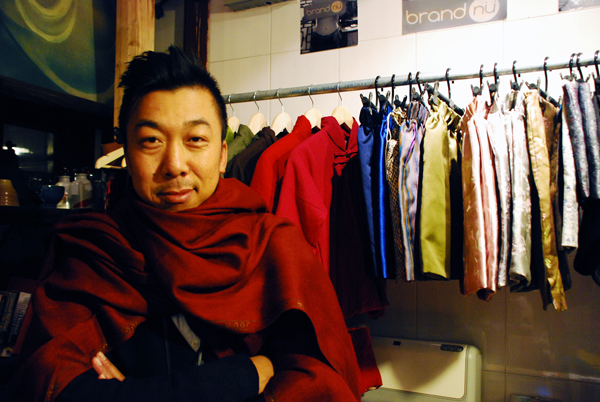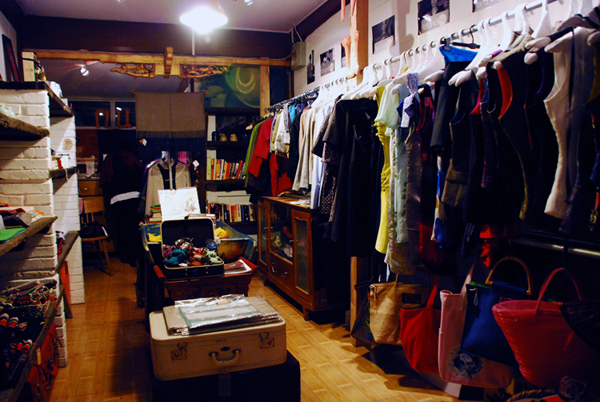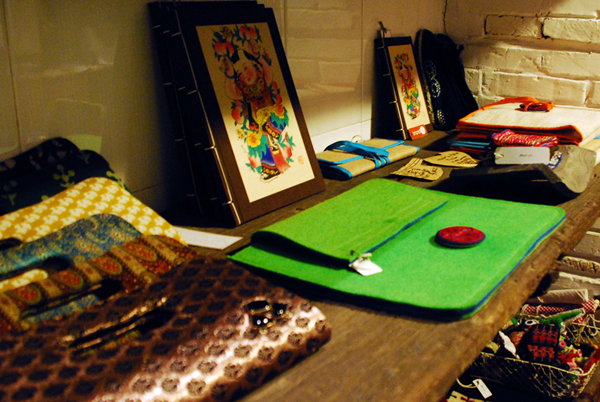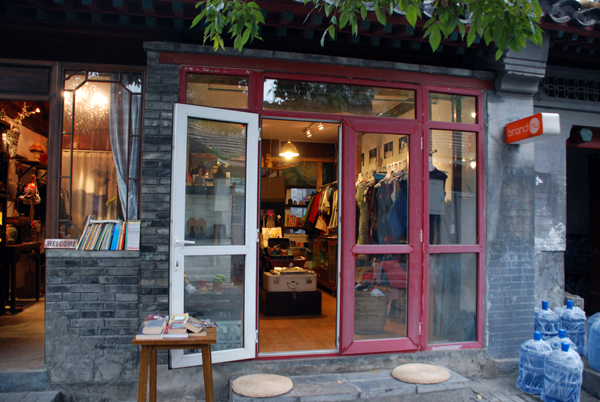Happy 2011! Wishing everyone all the best for the coming year :)
Here’s to the first post of 2011 and an update of my own!
Design Museum Boston is proud to present Tiffany Wan, the newest addition to our correspondents team. A graduate of Syracuse University and currently located in Beijing, Tiffany will be bringing an international perspective to DesigningAMuseum.org. An active member of the Industrial Designers Society of America, a practicing designer and avid photographer, Tiffany also catalogues her inspirations and thoughts on her personal blog.
In addition to some other freelance work, I’ve recently become a correspondent for Design Museum Boston and am excited to share my first post!
The holiday season is the time for giving and China is second to the US in its number of billionaires, according to the Times, but not anywhere close in philanthropy support. Donations in China have “risen from $1.5 billion (10 billion rmb) in 2006 to over $7.5 billion (50 billion rmb) last year, [but] it’s a negligible fraction of the $300 billion annually donated in the U.S.” How can we increase awareness of charitable organizations and their need of financial support? One person is using design to promote and develop such awareness in his own way; this person is Nathan Zhang.

Nathan Zhang is the owner of the small charity shop, Brandnü located in Beijing’s Wudaoying Hutong near Lama Temple. Although the project is for profit, “Brandnü is an ethical trade network for rural artisans. In partnership with China’s socially-conscious designers and artists, the Brandnü project aims to help (re)design rural livelihoods by offering support, resources and better access to urban markets.”
“Nü” is the Chinese word for female (女), but it also means “new”. One of the main missions of Brandnü is to support gender equity concerns. In Zhang’s words, “Nu is women. My main work is how I can help rural women redesign their handicrafts.” In order to do so, Brandnü works closely with female artisans through collaborating with Rural Women, a non-profit that aims to develop the potential of rural Chinese women.

Nathan Zhang was kind enough to take time out of his super busy schedule to give me some background about Brandnü, which has been open for just over a year. Zhang is continually trying to build his network of non-profits and designers to contribute to his project. He says “not a lot of people are doing this kind of work in China and I’m doing it at the right time. The project is moving forward everyday.” By connecting Rural Women with urban designers, Brandnü uses traditional crafstmanship skills to contribute to contemporary designs. Collaborating designers consider traditional skills such as embroidery and metal-smithing to inspire and create products for the current market. “We use the rural women’s handicraft skills, like embroidery, one of the main skills, and the urban designers design a very contemporary piece like scarves or jewelry,” said Zhang. He provides hourly wages to rural workers and once the shop is self-sustaining, a percentage of profits will go back to these people. Current products include bags, jewelry, electronics cases, and scarves. In addition to the custom created products, Brandnü carries products previously produced from workers by fair trade standards.
You’re probably wondering how Brandnü started. After spending about 10 years in Canada and starting his family, Zhang decided to move back to China in 2008. He was burnt out from the fashion media industry and it was time for him to do something more meaningful; “inspired by Fair Trade organizations like 10,000 villages and popular second hand shops in Canada,” Zhang started Brandnü. With the support of the successful Beijing T-shirt company, Plastered8, Zhang secured a shop space inWudaoying Hutong. Nathan’s forward thinking method and his individual concept of gender equity are unique in China.

True collaboration is still at a minimum. Women in Ningxia, for example, have limited access to the post office and other delivery services. The closest post office is almost a 3 hour car ride from their village. Communication is mostly by phone, providing difficulties in understanding the exact process of embroidery production. The craft work of these women is very much traditional and done entirely by hand. Brandnü aims to get a closer collaboration and connection between the designers and the craftswomen.
The goal of Brandnü is to develop its own product lines that combine traditional Chinese skills with contemporary designs. Products will be sold to higher end markets. The business practice must be sustainable in order to continue its mission of helping under-served women. Although Zhang must still iron out the details of his project and its contribution to society, his biggest challenge now is to find further funding.
Full of enthusiasm and seemingly endless energy, Zhang’s ideas for his own product lines range from recycled goods to bags and shoes to clothing. In addition to its own products, Brandnü carries goods made all over China that have similar social missions and values. Among these products is Tranquil Tuesdays Tea, which helps women develop useful skills through working in the tea industry. There are also bags designed by PAE-Halo, candles supporting Magic Hospital, small animal dolls from Shandong, and woven sandals from Guizhou.

Of course there’s always the controversy of fair trade versusexploitation, but that’s a totally different topic. First, come to Beijing and support a little shop called Brandnü that’s trying to make a big difference.
Brandnü is located at 61 West Wudaoying Hutong, Dongcheng District
北京东城五道营胡同61号西
My attempted Chinese translation:
我试试用汉语翻译:
西方的冬天节日是该多善心,根据《时代周刊》杂志说,在世界上, 除了美国以外,中国有最多亿万富翁。但是中国比美国的善款和善心没有比,再说不可能比。虽然中国人越来越多给捐款,2006年中国人善款了1点5亿美元,然后2009年他们善款7点5亿美元以上,但七点五亿美元不可能比美国的每年善款的三千亿美元。呢么,我们怎么可以让人多捐款或帮非正副职和和慈善组织?我成为了一个中国朋友,他启发了我;叫张慧祥。
张慧祥开了一个小慈善商店,Brandnü在北京五道营胡同在雍和宫附近。虽然他的项目是挣钱的,“ Brandnü 是一家以经营农村妇女和其他弱势群体生产的手工艺品为主的慈善公益商店,并一直构建一个联系城市和西方设计师与中国传统手工艺生产者的爱心平台来实现农村妇女经济自立的梦想”。
“Nü” 代表汉语的‘女’,但在英语也代表‘新’。 对Brandnü最总要的目的是关于性别平等。张先生用英语说‘女是女人。我最总要的工程是帮农村妇女生活(再)设计’。Brandnü和农村的女匠一起合作,现在大部分合作是帮‘农家女’磁山组织帮他们的农村匠。
张慧祥非常忙但我感谢他有时间和我说一说Brandnü的背景,Brandnü刚去年开店。张先生常认识多设计师和慈善组织让他们跟他的商店合作。他说在中国很少的人在做这样的工作,他现在的时间很适合。张先生帮农村妇女匠和城区设计师做合作和项目。他们一起做的产品有钱包买啦,首饰啦,围巾啦,笔记本包,等别的生活用具。这些产品都用工艺品展的规定来做。
你是不是在想Brandnü怎么开始的?张先生呆着十年在加拿大,有家庭,然后2008年决定搬回中国。在加拿大,有很多组织和二手商店启发啦他。搬到北京张先生让朋友帮他开了Brandnü也找到五道营的地方开店。在中国张慧祥的商店帮性别平等只有他一位。
真正的妇女匠合设计师的作还是很难。比如说,宁夏妇女大部分用电话交流因为她们的邮局从农村要开车三个小时才能到。呢么关于手工的做法比较难交流。妇女匠用传统的手工,Brandnü希望能让她们和城区设计师有密切的关系。
Brandnü的目的是能用中国传统艺做出自己的现代产品线,然后产品会当高档东四卖的。生意一定要持续才能得到目的帮农村妇女。张先生需要细点儿决定他的项目做法和怎么帮社会,但是现在最难的是找招商。
张慧祥有多积极性和经历,他自己做产品也有非常多概念从再造东四到钱包,鞋子和衣服。除了自己的产品以外,Brandnü也卖别的在中国做的有对社会帮助的产品。
当然这样用做生意可能有争议,但线来北京看看这家小商店想有很大的帮助。
Brandnü在北京东城五道营胡同61号西。
One thought on “Happy New Year! (and A Brandnü Way of Thinking)”
I am glad to know people like you, tiffany!Your Chinese is much more good than I thought, have a good time in Beijing.